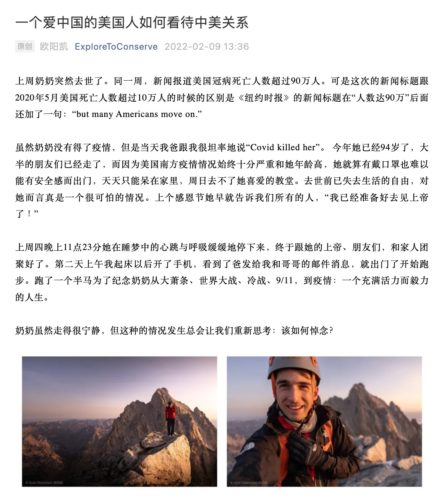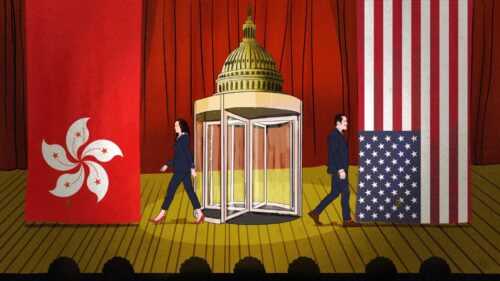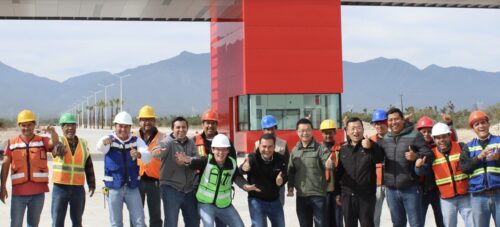
“I hope we can all have the courage to face and criticize ourselves, to understand others and have the goodwill to place ourselves in their shoes.”

A few days ago, I decided to risk it all. Depressed by the status quo, I wrote a political essay in Chinese about U.S.-China relations and released it on Weibo to 150,000+ followers and held my breath.
Every week, headlines are written about China in the context of competition: trade, tech, information, 5G. We’re embittered by an 18-year-old ski prodigy and have gone from panda diplomacy to panda war (the Anti-China PANDA Act has arrived).
Behind these currents is the highest prevalence of negative U.S. opinion toward China since we began measuring it. Only slightly fewer Chinese seem to dislike us. Only 62% hold an unfavorable view of Americans, compared to our 79% against them.
For those who find themselves with ties to both countries, we’ve entered a stage of incredible loss.
The dissolution of the relationship hits us in uniquely excruciating ways. Families are cut off, academic and career plans ruined. We feel pressed to pick sides — as if choosing one divorced parent to live with was even possible. Dealing with the unraveling of U.S.-China relations is a grieving process similar to coping with the spiraling effects of climate change.
The worst way to resolve such ambiguous loss is by looking at comments online. Since lockdown I’ve been following pro-Chinese Twitter accounts alongside Western ones they decry. Unsurprisingly, both sides are entrenched in personal convictions and lack the character count to humanize the other side.
Systems theory would say we’re trapped in a positive feedback loop, a system whose inputs and feedback are only intensifying the direction of change. Unwinnable Twitter feuds aside, a more interesting example is: the more we write how Beijing influences the influencers, the more Beijing and the influencers will say we misunderstand China, only leading to more fuel for investigative journalism. Systems theory also posits that, inevitably, unchecked positive feedback loops tend toward self-destruction.
This is not to devalue reporting, but in many cases, the process may be fueling the very issues it exposes.
But I had an itching feeling we’re not as stuck as we seem. That’s why my essay, “How a China-loving American sees U.S.-China relations,” ran counter to People’s Daily headlines, YouTube influencers, U.S. Senators, and my past political science professors, pleading for nothing more than love in international relations.
In the replies, I found I wasn’t alone:
“From the start of COVID and the souring of U.S.-China relations, the one phrase my mom has said the most is: ‘I hope the U.S. and China don’t go to war.’”
“News from each country both say the other is wrong, but actually for us normal people I think we need to calm down, look more at the other’s positives. The world will only be happy if the U.S. and China hug each other.”
“I cried reading this… I really like all areas of all nations of the world and all peoples. I hate racialism, I hate populism.”
“There exists love, understanding, tolerance, and also endless generations with visions for peace. The time will certainly come!”
“When I was abroad, I’d see some things that weren’t so friendly, but there was also good. And when I see social media and news it’s too painful. So many people can’t even realistically express their opinion, they’re only venting personal emotions. Even the authorities are speaking for themselves and not listening to the other side. This kind of situation already cannot be called ‘communication.’”
“I firmly believe we can break this so-called cycle, even though we’re stuck in a vortex, it will change, it must!!!”
“Dear God, Bhudda, Allah, great Laozi, grandpa Marx, please give kind people the strength and luck they deserve.”
“Politics is not life nor is it individuals. To the greatest extent possible we mustn’t be influenced by government.”
“I believe most Chinese continue to hold kindness toward American people, at least the friends and family around me all do.”
“I feel the same as you. U.S.-China relations, being on opposing sides of context and language online, are splitting farther apart, it’s tragic.”
“The Chinese people will always stand with the American people, except for a few certain American politicians.”
“ONE LOVE”
“As a person who loves the different cultures of the world, current international relations really sadden me. It’s like all the world sees us as the enemy. But I believe in my country, our country will be stronger, and our young people need to use their actions to break the outside world’s bias toward us. The growth and competition between nations is doomed to make people biased and ill-willed toward others. I just want to lean upon myself, do what I want to do and can do, go and feel the differences of this world, and still yearn for a world of peace and love.”
For those of us foreigners without visas to return to China or Chinese nationals without the means to go home, the world can seem increasingly narrow. But I’m not alone in holding out for a relationship above competitive interdependence. We may not be the loudest, or even the majority, but I found there’s just enough to renew my faith and remind us that we’re just people with the same dreams.
My essay received more than 100,00 views and hundreds of comments within two days. I wasn’t purged. Many expressed their feelings of relief and agreement in reading my honesty. In the end, though, the replies stopped. Some even vanished. At the bottom of the comment section was this thin line of tiny gray words:
“已过滤不当言论,部分评论暂不展示” — “Unsuitable remarks already filtered out, some comments temporarily hidden.”

“The people of the two countries are actually very simple, it’s the controversies between governments that are influencing how the people interact.”
“I gave up on these social media platforms, and my world became much quieter and more peaceful.”
“The souring of relations makes both countries have people on the extremes, they blindly slander and don’t listen. Others want to change it but find they cannot. I’m studying international business and hope in the future my knowledge can be used here to help.”
“Although in the Olympic opening ceremony Zhang Yimou tried to transmit the beautiful message of ‘Imagine all the people living life in peace,’ the reality is not that beautiful. But that future will eventually come.”
“As a Chinese working for an American company in Japan, I hope all the time that we can throw away politics and differences and stop criticizing others. If we try to understand each other we’ll find that people really have more in common than not. If an alien saw us from outer space, they might not be able to understand why, actually, we are criticizing and fighting each other.”
“As a Chinese in America I really hope the relationship between our two countries can be friendly, but the environment in front of my eyes has turned so bad that I truly feel powerless.”
“I also believe love is the answer to solve all problems.”







